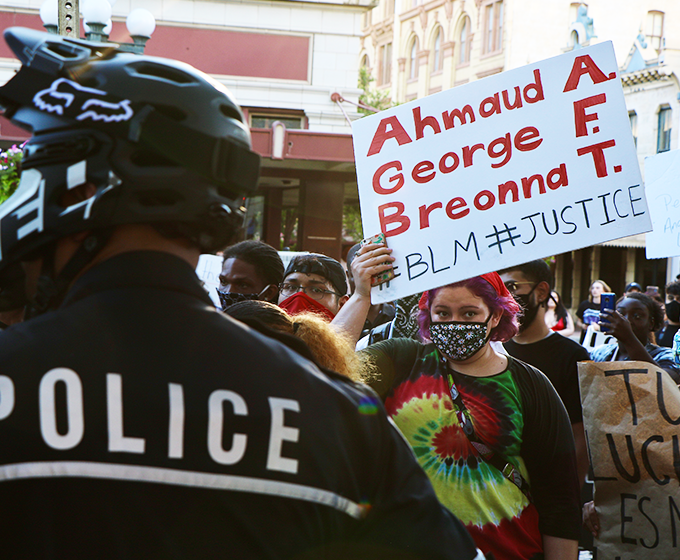
Protesters march in downtown San Antonio after the death of George Floyd. (Photo by James Dobbins)
JUNE 16, 2020 — Often when a university establishes a new college, the leadership chooses the passive name the college of something, for example, the College of Business. Yet when it came time to name UTSA’s new College for Health, Community and Policy, the preposition means all the difference in how its new dean views the college’s mission.
“We will work together to improve the community’s health via policy,” Dean Lynne Cossman said. “I want to make sure our research is community-engaged, as noted in the college name.”
In support of this mission, the students and faculty of the college are active beyond the limited rhetoric of politics that can result in a better future for future generations. As Cossman has noted, the college includes the study of criminology and criminal Justice, sociology, psychology, social work, public health, demography, kinesiology and nutrition.
Together, these disciplines, for example, “help us understand our individual and collective reactions to George Floyd’s death and police brutality,” Cossman said, “and help us heal from these sorts of emotional trauma and nourish our bodies in these incredibly challenging times.”
 Protesters march in downtown San Antonio in June in the aftermath of the killing of George Floyd. (Photos by James Dobbins)
Protesters march in downtown San Antonio in June in the aftermath of the killing of George Floyd. (Photos by James Dobbins)
Here’s a collection of research being undertaken by college faculty:
Sherri Simmons-Horton, a postdoctoral fellow and licensed master social worker, will speak as a panelist June 16 at 2 p.m. at Critical Conversations: A Symposium on the Intersections of Race, Child Welfare, and Criminal Justice in Texas with the Texas Alliance of Child and Family Services.
Simmons-Horton will discuss the critical issue of racial disparities within the child welfare and juvenile justice systems. Data show that over 65% of children in the Texas foster care system are black and Hispanic—a disproportional amount compared to the American population overall.
“Scenes of inhumane treatment of black men and women is far too common in our society,” said Simmons-Horton. “Academia is uniquely positioned to address structural anti-black racism through research and community building, which highlights the black family’s strengths and resilience and challenges systems to be accountable for practices and policies that criminalize black existence. The first step is for those working within systems to get comfortable having uncomfortable conversations about white privilege, and its role in racist structures.”
Recently, Michael R. Smith, a professor in the Department of Criminology and Criminal Justice, wrote an op-ed suggesting how to improve policing in the United States. Smith wrote, “Cynicism and lack of empathy are an occupational hazard in police work and are riskier to officers than unexpected violence or gunfire. But with proper training, leadership and support mechanisms in place, they can be managed and kept in check.”
Smith, a former police officer, has been studying the criminal justice system as a scholar for more than 25 years. His work is a leading example of how UTSA is helping fight back against systematic social failures and offering understanding so we can see the humanity of every individual.
Additionally, demography professor Rogelio Sáenz has examined the catastrophe that COVID-19 has had on the Hispanic community. His analysis found Hispanic people are overrepresented among people infected with the novel coronavirus relative to their share in 29 of the 35 states that report Hispanic cases.
Sáenz found that, while Hispanics are overrepresented in the virus contraction data, they are underrepresented in the number of COVID-19 fatalities. “However,” Sáenz wrote, “what seems to be relatively good news regarding lower than expected deaths is due to Latinos being a youthful population with comparatively low portions of the population in older ages.”
Available data, when adjusted for age, shows Hispanics have significantly higher death rates than whites.
The social workers in HCaP are taking direct action for change. Their department started an antiracism action team, formed in response to the Black Lives Matter movenemt’s calls for engagement.
Amy Chanmugan, the chair of the social work program, recognizes the urgent need to train social workers to be culturally competent catalysts for ethical practices.
“We know what must be done,” Chanmugan said. “We need to engage in continuous and deep reflection to commit strongly to antiracist social work practices. Our goal is for the work to be long-term and sustainable.”
Professor Jelena Todic’s research examines restorative justice in K–12 schools as an approach to simultaneously interrupting the school-to-prison pipeline, which disproportionately impacts black youth, and responding to associated health inequities. In another project with professor Candace Christensen, they examine transformative and restorative justice as responses to sexual violence. Both of these projects are aligned with the Movement for Black Lives national agenda and rooted in the current abolitionist vision to create lasting community-based alternatives to punishment and imprisonment. These are just a few among many projects the Department of Social Work is participating in to fulfill its mission.
HCaP is also supporting the work of professor Jeffrey Howard in the Department of Public Health. His research looks at census privacy and the effect it has on minority groups. For the 2020 census, the U.S. Census Bureau is proposing to use differential privacy, a new way to protect the identities of individuals when publishing public data. The data is used to distribute federal funding to communities and determines congressional representation.
Howard examined the mortality rates based on 2010 census data and applied the new method of differential policy to see how it compared to existing model’s. The results? “The currently proposed method for protecting privacy in the 2020 census results in significant under- or overcounting of the population, compared to previous methods,” he said.
“Professor Howard’s work on overcounting and undercounting in the census is critical because we use census results to assign appropriations and as a basis for all other demographic calculations,” said Cossman.
Erica Sosa, associate dean of graduate studies in HCaP, is studying, with the help of the San Antonio Metropolitan Health District, racial inequalities in access to health services.
⇒ Explore the College for Health, Community and Policy at UTSA.
The deep-rooted racism and injustices embedded in our society are a stark reminder of how far the United States is from a just and fair system. The killings of George Floyd, Michael Brown, Eric Garner and Breonna Taylor, among countless other acts of senseless killings, have galvanized a protest movement for rapid and national change unlike we have seen in a generation.
UTSA is committed to supporting faculty, staff and students in their confrontation with racial bias and aggression. The university recognizes the need for continued conversations around policing and structural reforms.
To that end, UTSA’s College for Health, Community and Policy is dedicated to the advancement of public policy and practice that contributes to the public good within diverse local and global communities through nationally recognized research, educational programs focused on engaged learning and collaborative partnerships. In addition to its eight academic departments, the college houses the Institute for Demographic and Socioeconomic Research, the Policy Studies Center, and the Health and Kinesiology Research Laboratories. HCaP includes more than 175 faculty and more than 6,800 students pursuing undergraduate and graduate degrees.
UTSA Today is produced by University Communications and Marketing, the official news source of The University of Texas at San Antonio. Send your feedback to news@utsa.edu. Keep up-to-date on UTSA news by visiting UTSA Today. Connect with UTSA online at Facebook, Twitter, Youtube and Instagram.
Día en la Sombrilla, formerly Fiesta UTSA, is a festival hosted each spring as a part of Fiesta® San Antonio events. Sponsored by Roadrunner Productions, the event features music, food, confetti, games, event t-shirts, and more.
Sombrilla Plaza, Main CampusCovidence is a systematic & scoping review tool used to streamline the process of screening and reviewing articles. Using this software, research teams can easily import studies, perform automatic deduplication, and extract data using templates. This workshop will show attendees how to start a review in Covidence, add collaborators, and get started on screening.
Virtual (Zoom)In this workshop, attendees will be introduced to Pandas, a Python tool for working with data easily. It makes it simple to organize and analyze information when data is organized and categorized, like spreadsheets or tables.
Group Spot B, John Peace LibraryEach fall and spring semester, students convene at the Main Campus at UTSA with booths, ideas and prototypes. A crowd of judges, local organizations, students, faculty and sponsors walk around and talk to the students about their projects and ask questions. Students get the real-life experience of "pitching" their project with hopes of getting funding or support to move to the next level.
UTSA Convocation Center, Main CampusJoin the doctoral candidates for the Doctoral Conferreal Ceremony and celebrate their accomplishments.
Arts Building Recital Hall, Main CampusCelebrate the graduates from the Carlos Alvarez College of Business, College of Education and Human Development, Margie and Bill Klesse College of Engineering and Integrated Design and University College.
AlamodomeCelebrate the graduates from the College for Health, Community and Policy, College of Liberal and Fine Arts and College of Sciences.
AlamodomeThe University of Texas at San Antonio is dedicated to the advancement of knowledge through research and discovery, teaching and learning, community engagement and public service. As an institution of access and excellence, UTSA embraces multicultural traditions and serves as a center for intellectual and creative resources as well as a catalyst for socioeconomic development and the commercialization of intellectual property - for Texas, the nation and the world.
To be a premier public research university, providing access to educational excellence and preparing citizen leaders for the global environment.
We encourage an environment of dialogue and discovery, where integrity, excellence, respect, collaboration and innovation are fostered.